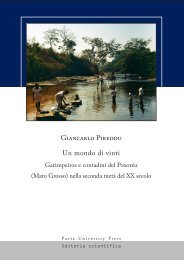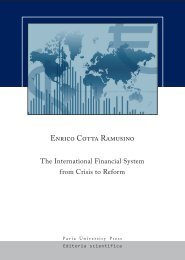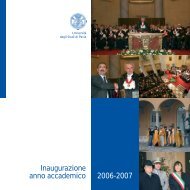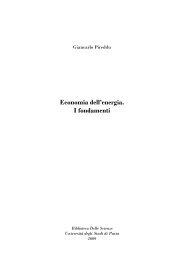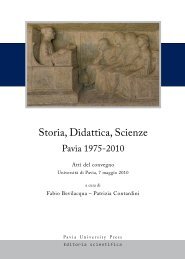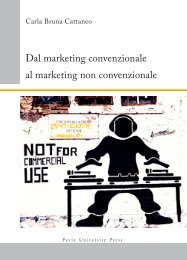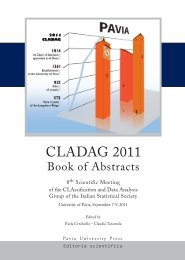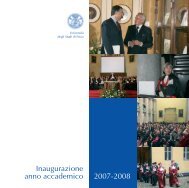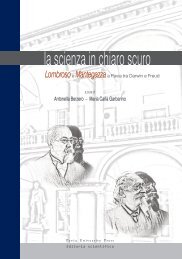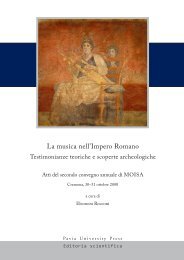Musica che affronta il silenzio - Scritti su Toru Takemitsu - Pavia ...
Musica che affronta il silenzio - Scritti su Toru Takemitsu - Pavia ...
Musica che affronta il silenzio - Scritti su Toru Takemitsu - Pavia ...
You also want an ePaper? Increase the reach of your titles
YUMPU automatically turns print PDFs into web optimized ePapers that Google loves.
152<br />
Giangiorgio Pasqualotto<br />
‘The task of the composer should begin with the recognition of the sounds themselves<br />
rather than with concern about their function’ (Takemit<strong>su</strong> 1995: 80). 2 In saying this<br />
Takemit<strong>su</strong> seems to want to go beyond the concept of music as the construction of sounds<br />
in order to tap into a sort of ‘pure experience’ of sound. I would emphasise that the concept<br />
of ‘pure experience’ is fundamental and wide-reaching in Japanese thought, although<br />
Takemit<strong>su</strong> is probably referring to it unconsciously. He intends not to deny the idea of music<br />
as the construction of sounds, but to maintain that no aural construction can forego<br />
considering sound first and foremost for its own sake, as a physical event. In other words,<br />
for Tru Takemit<strong>su</strong> the essence of music is not to be sought in the abstract, mathematical<br />
conceptualization of the relations between the notes, but in the unlimited complexity of<br />
sound itself: a single sound is a universe of practically boundless meanings. This must not,<br />
however, be taken to mean that Takemit<strong>su</strong> neglects, or less st<strong>il</strong>l ignores, the languages and<br />
logical patterns devised, above all in the West, for in music notation. As Peter Burt has<br />
shown, Takemit<strong>su</strong> had not only studied them but also, for a considerable period of time,<br />
worked within them. To my mind Takemit<strong>su</strong>’s greatness lies precisely in this ambition to<br />
grasp the essence of each and every type of music, irrespective of <strong>su</strong>ch distinctions as Eastern/Western<br />
or rhythmic/melodic. At the same time he recognised the need to know and<br />
possess the specific forms and techniques of musical composition. Or to put it the other<br />
way round, he demonstrated his ab<strong>il</strong>ity to master these forms and techniques, recalling how<br />
they are inextricably rooted in a ‘pure experience’ of sound and s<strong>il</strong>ences prior to any<br />
attempt at musical notation.<br />
I intend to show how there is no opposition in Takemit<strong>su</strong>’s work between the pure<br />
experience of sound and an abstract experience drawing on the mathematical or linguistic<br />
transposition of deliberately created sounds. First it is important to understand<br />
how Japanese culture invariably refers to a profound dimension which precedes and<br />
underpins every formalization.<br />
This desire to go to the roots and source of music appears to be perfectly reflected in<br />
the traditional Japanese belief that the fundamental goal of human life is not to produce<br />
representations of things, facts and events, but rather to grasp their original vital matrix,<br />
which precedes any description or classification relying on abstract concepts or systems. At<br />
the same, however, this experience of the vital matrix is not set against the universes of<br />
forms generated from it. Instead artists are careful to show the continuity between the forms<br />
produced and that matrix which renders them possible.<br />
To appreciate just how essential this continual reference to a dimension that grounds<br />
and precedes every formalization is in traditional Japanese culture, we can refer to various<br />
specific expressions of this culture, including religion, ph<strong>il</strong>osophy, painting, architecture,<br />
and above all poetry.<br />
2 Cit. in Burt (2001: 242).



